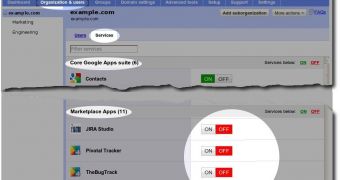Google has made it a bit easier for Google Apps administrators to manage the apps their users see, especially if they have third-party apps from the Marketplace installed.
There is now a central spot for enabling or disabling any app for users or groups. Admins can now, literally, turn apps On and Off from the same page, regardless of whether those apps are Google's or third-party.
Note though that the setting only affects what your users and groups 'see' as available apps, not what they can actually access. This is controlled separately.
"You may have already noticed, but the controls to enable and disable individual apps in Google Apps are now all in one place on the domain Control Panel under Organization & users > Services," Google's Andy Rothfusz writes.
"Domain administrators were already able to use this tab to enable and disable the Core Google Apps suite. Now they can do the same for apps they've acquired from the Google Apps Marketplace," he said.
The new control panel enables to set the visibility of apps, across the organization, but, more importantly, for the various groups, or sub-organizations within.
This way, admins can make sure that users won't be cluttered with apps they don't need or should not use. It also means that certain apps can be made visible to just the groups that need them.
"This visibility toggle feature is not a substitute for checking that the users accessing your app have a valid license," Google explained.
"Similarly, the on/off switch does not affect the OAuth scopes your app has been granted when the domain admin installed your app," it said.
In the first case, all users will be able to authenticate themselves, via OpenID which is enabled for Google Apps domains, on any app, regardless of whether it's visible or not, unless the admin specifically forbid it.
The same goes for OAuth, admins have to manually remove data access to the app or the app entirely if they don't want users accessing them.

 14 DAY TRIAL //
14 DAY TRIAL //